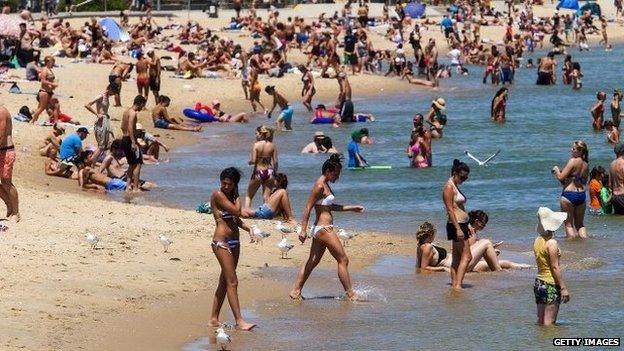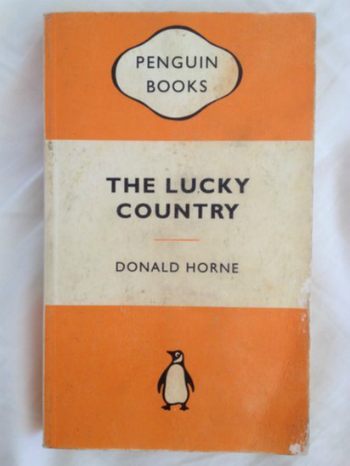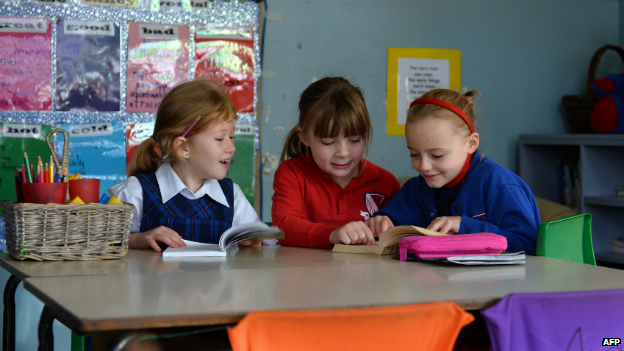Is Australia still the Lucky Country?
- Published

Australia is a successful and prosperous country, but would Donald Horne still say it was a lucky one?
It's 50 years since the publication of one of Australia's most iconic books.
The Lucky Country by Donald Horne, which came out in 1964, has gone on to become a cult classic, as well as saddling this land with an entirely misappropriated nickname.
On arriving in Australia just over a year ago, it was the first book I read having received a recommendation from my predecessor.
"That sounds upbeat," I thought, seeking inspiration for my new life down under.
It is, however, a thoroughly depressing read. A damning and bleak assessment of Australian society in the early 1960s.

The Lucky Country caused a stir when it came out in 1964
"A bucket of cold saltwater emptied onto the belly of a dreaming sunbather," is how one critic described it at the time.
The opening words of its final chapter sum up the book's thesis:
"Australia is a lucky country run mainly by second rate people who share its luck. It lives on other people's ideas, and, although its ordinary people are adaptable, most of its leaders (in all fields) so lack curiosity about the events that surround them that they are often taken by surprise."
Essentially, Horne painted a picture of a deeply conservative and unambitious country that had got to where it was by luck rather than merit, riding on the coat tails of its historical ties to Britain.
"In the lucky style we have never 'earned' our democracy. We simply went along with some British habits," Horne wrote in his 1976 follow-up, Death of a Lucky Country.
The fact that the book's title was ironic and that most people referring these days to Australia as The Lucky Country do so in a positive light, drove Horne round the bend.
"I have had to sit through the most appalling rubbish as successive generations misapplied this phrase," Horne later went on to say.
In 1964 though, despite being unoptimistically received by its publisher, The Lucky Country clearly touched a nerve with the Australian public.
It sold more than 100,000 copies in its first year, an Australian record for a book of its type. It's now in its sixth edition.
Australian Prime Minister Tony Abbott recently described the book's publication as one of the defining moments, external in Australia's history.
The question for many is whether Donald Horne's assessment still applies. Does Australia remain the Lucky Country?
Comparing the stats
It is undoubtedly a successful and prosperous one.
When the world's leaders come to Brisbane in a few weeks for the G20 summit, with an agenda including trying to lift more of the global population out of poverty, they will be doing so from the five-star comfort of an incredibly affluent society.
A study by investment bank Credit Suisse recently judged, external Australians to be the richest people in the world, with a median Australian adult worth more than US$225,000 (A$258,000), most of that due to high property values.
Research by the Economist Intelligence Unit listed Australia, external as the second best country in the world to be born, beaten only by the high-flying Swiss.
Australian cities regularly pepper the top 10 of best places to live. Melbourne, Sydney, Perth and Adelaide all made it into the business end of the Economist's latest liveability index, external.
And before the rest of the world gets too green with envy, those cities are also among the most expensive places to set up home, external.
As in most wealthy countries, however, there are pockets of extreme poverty here. Australia's indigenous population fares especially badly.

Australian cities are among the best in the world to live in, but the country still suffers from poverty
Life expectancy, a key economic indicator, for the Aboriginal and Torres Strait Islander population is more than 10 years less, external than for the non-indigenous population.
A recent study by the Australian Council of Social Service showed that one in seven Australians live below the poverty line.
But the poverty line is Australia is considered to US$350 (A$400) a week for a single adult and US$740 (A$840) a week for a couple with two children.
That's not a lot of money to live on in Australia but it compares pretty well to the world's other wealthy nations, let alone the poor ones.
The US Census Bureau considers, external the poverty line to be just US$228 (A$260) a week for a single adult and US$454 (A$515) a week for a family of two adults and 2 children.
In Australia, the average wage, external in May 2014 before tax was US$51,383 (A$58,239) a year and US$69,413 (A$78,701) for full time workers.
In 2013 the average wage for an US individual, external was just US$43,041 (A$48,784) and the median wage was just US$28,031 (A$31,757).
A nation of whingers?
An Australian friend of mine joked to me the other day: "Forget the whinging poms, we've become a nation of whinging Aussies."
He suggested people in Sydney regard A$100,000 (US$88,0000) as a normal wage for a relatively successful person.
Australia has enjoyed 23 years of consecutive economic growth. It has been one of the world's few developed economies to avoid the global financial crisis.
Much of that success has been built on the country's vast mineral wealth, a mining boom that has lasted more than a decade and which arguably is still going, be it at a slower pace.
Some might argue that mineral wealth again makes Australia a lucky country; one which hasn't got rich through innovation but rather through the good fortune to sit on huge piles of coal, iron ore, copper and uranium.
Of course that's not to say that many other countries haven't profited from similar good fortune. Saudi Arabia must surely be the luckiest of them all.
But in the innovation stakes, Australia still fares pretty badly.

Despite several pledges, successive governments have failed to boost the teaching of Asian languages
The Economist's Economic Innovation Index has Australia ranked 22nd, way behind the likes of Japan, the US, Germany and Sweden.
Similarly on the magazine's Technological Readiness Index, Australia again fails to get into the top 20 - trailing behind the likes of Portugal, Belgium, Israel and Iceland.
Anyone who's experienced Australia's mind-numbingly slow internet connections can testify to that particular low score.
Australia has long been promising to embrace "the Asian Century".
The country once faced the "tyranny of distance" in terms of European export markets but now finds itself practically on the doorstep of the fast growing economies of East Asia.
Yet successive governments have still not managed to meet their pledges to increase the teaching of Asian languages in Australia's schools.
Donald Horne died in 2005 as Australia entered the peak years of its prosperity. We'll never know if he would still consider his homeland to be the Lucky Country.
All this is not to say that Australia is not a wonderful place to live. I, for one, can vouch for Sydney as being one of the world's coolest and most fabulous cities.
I feel lucky to be here. As to whether I got here on merit, I'll leave that for others to judge.